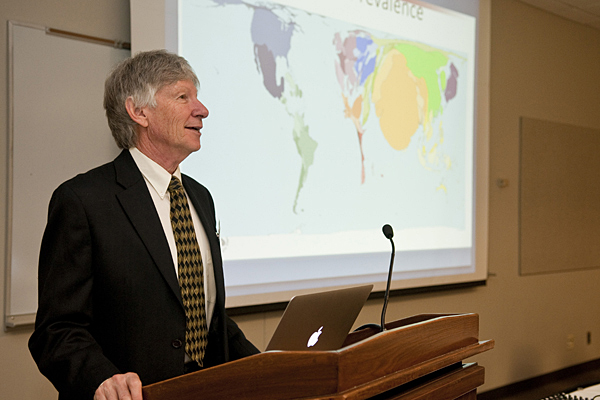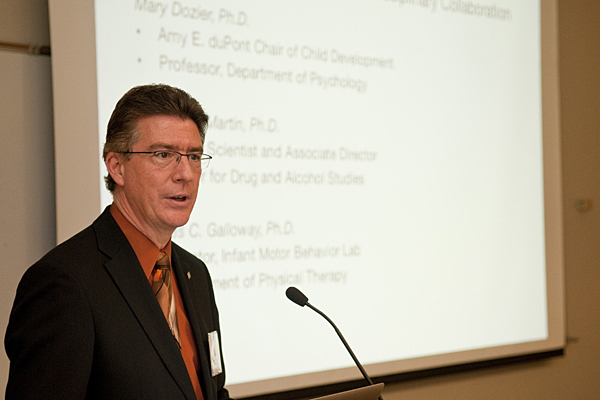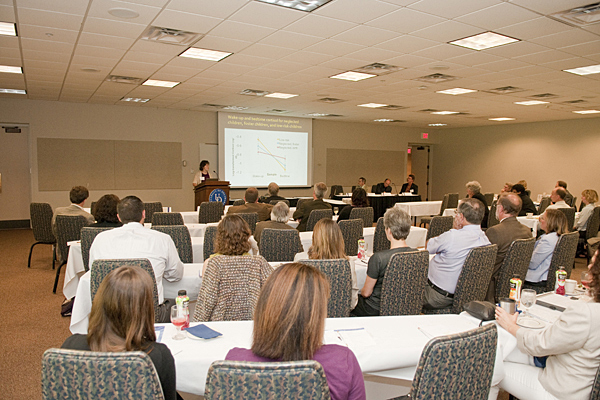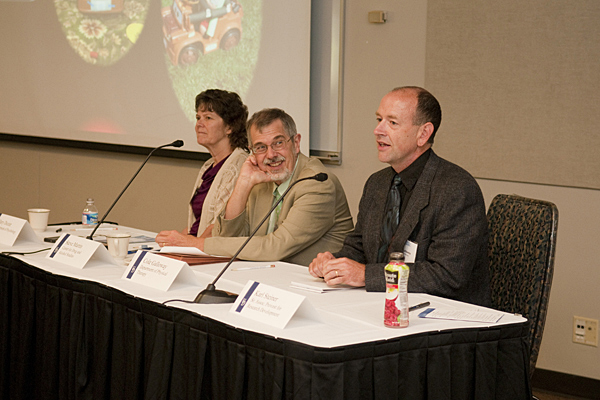


Social sciences, human health
Social and health scientists meet to explore collaboration at UD symposium
11:23 a.m., Oct. 7, 2011--More than 50 University of Delaware faculty members representing behavioral, social, physical and health sciences met at Clayton Hall on Friday, Sept. 30, at the inaugural Social Sciences and Human Health Symposium.
Sponsored by the Provost’s Social Science Task Force and the Research Development Office, the event was aimed at advancing cross-campus collaborations and sparking dialogue about the growing role of social sciences and translational research.
Research Stories
Chronic wounds
Prof. Heck's legacy
Provost Tom Apple opened the symposium and expressed strong support for the overall goals of the meeting—to advance on-campus collaborations in the social and health sciences and spark dialogue about the role of social sciences in translational research.
“The task force was established to explore ways of better connecting with some of the unique expertise in social and behavioral sciences on our campus,” Apple said. “Today I see that we are off to a great start. ”
In his keynote address, Robert Kaplan, director of the Office of Behavioral and Social Sciences Research (OBSSR) at the National Institutes of Health, discussed NIH perspectives and opportunities in these areas.
NIH funds basic research on behavioral and social mechanisms that affect health at the individual and population levels and on bio-behavioral-social interrelationships. The agency also supports translational research on the conversion of basic knowledge into practice that improves health at the individual and population levels.
Kaplan described an evolving area of research called exposomics, which measures an individual’s exposures—from the environment, diet, lifestyle, etc.—over his or her lifetime and how those exposures relate to disease. The exposome complements the genome, which accounts for the genetic contribution to health.
Another focal area for NIH is global health. “Our office recognizes the collective importance of global health in our increasingly interconnected society,” Kaplan said, “and the role we can play in helping to ameliorate global disease burden through increased capacity, collaboration, and partnership.”
He also commented on the rising cost of health care: “If other prices had grown as quickly as health care costs since 1945, a dozen eggs would cost $55, a gallon of milk would cost $48, and a dozen oranges would cost $134.”
However, it’s not just about health care, Kaplan said, as Americans have been slow to give up such risky behaviors as smoking, poor diet and lack of physical activity. He also pointed out that while billions of dollars are spent to develop next-generation therapies, low-tech solutions can have a big impact on improving health. For example, he cited a 2006 study showing that office reminders for cholesterol treatments are estimated to prevent seven times more deaths than replacing older cholesterol-lowering drugs with more potent medicines.
One particularly important point Kaplan made is that OBSSR does not fund research directly but rather through the NIH institutes and centers, making collaboration of paramount importance to the office’s mission.
Kathleen Matt, dean of the College of Health Sciences and executive director of the Delaware Health Sciences Alliance (DHSA), said she appreciated Kaplan’s focus on the growing role of behavioral and socials scientist in conducting biomedical research and his emphasis on interdisciplinary and translational research.
“Bridging the gap from bench to bedside through translational research requires detailed understanding of the social and societal implications,” she said. “Today’s meeting provides a platform to establish meaningful collaborations to address these challenges. We also want everyone to know that DHSA has a new program to fund pilot projects in the social sciences.”
Following Kaplan’s talk, an interactive panel provided successful models of cross-disciplinary collaborations. Participants included Mary Dozier, Amy E. du Pont Chair of Child Development in the Department of Psychology; Steven Martin, senior scientist and associate director of the Center for Drug and Alcohol Studies; and Cole Galloway, director of the Infant Motor Behavior Lab and associate professor in the Department of Physical Therapy.
Karl Steiner, senior associate provost for research development, was encouraged by the strong turnout of faculty from across campus and the level of productive conversations throughout the day. “Today’s symposium provides the base on which we can build a long-term effort to involve faculty in productive and impactful research programs,” he said.
About the symposium
The symposium was the first in a series of smaller social science and health science initiatives planned for the academic year, such as mini research colloquiums to highlight faculty expertise.
The next event is scheduled for Nov. 9, from 4:30 - 6 p.m., in 104 Gore Hall. The agenda includes presentations and discussions by three UD faculty members: Barret Michalec, Department of Sociology and Criminal Justice; Melissa Melby, Department of Anthropology; and Mia Papas, Department of Behavioral Health and Nutrition. The event is free and open to the UD community.
About the task force
The Provost’s Social Sciences Task Force, originally chaired by former associate provost Suzanne Austin, included members from all colleges. The symposium was planned by a sub-group including Joe Pika, interim associate dean in the College of Arts and Sciences and professor in the Department of Political Science and International Relations; Elizabeth Orsega-Smith, associate professor in the Department of Behavioral Health and Nutrition; Sue McNeill, professor in the Department of Civil and Environmental Engineering; Leigh Botner, manager of proposal development; and Steiner.
Article by Diane Kukich
Photos by Doug Baker











